Comprehensive Report on Hypertension: Patient Management and Treatment
VerifiedAdded on 2020/04/29
|13
|3931
|88
Report
AI Summary
This report provides a comprehensive overview of hypertension, a health condition characterized by high blood pressure. It details the causes, including lifestyle factors like diet, smoking, and stress, as well as genetic predispositions. The report highlights the symptoms of hypertension such as headaches, fatigue, and chest pain. It then discusses various management and treatment strategies, including lifestyle changes such as exercise and dietary modifications, and the use of medications like amlodipine and chlorthalidone. The report also addresses coronary artery diseases (CAD) and diagnostic procedures such as electrocardiograms. The report emphasizes the importance of professional medical advice and adherence to treatment plans for effective hypertension management. This assignment is intended to provide a detailed analysis of hypertension and its impact on patients, including the different treatment options available.
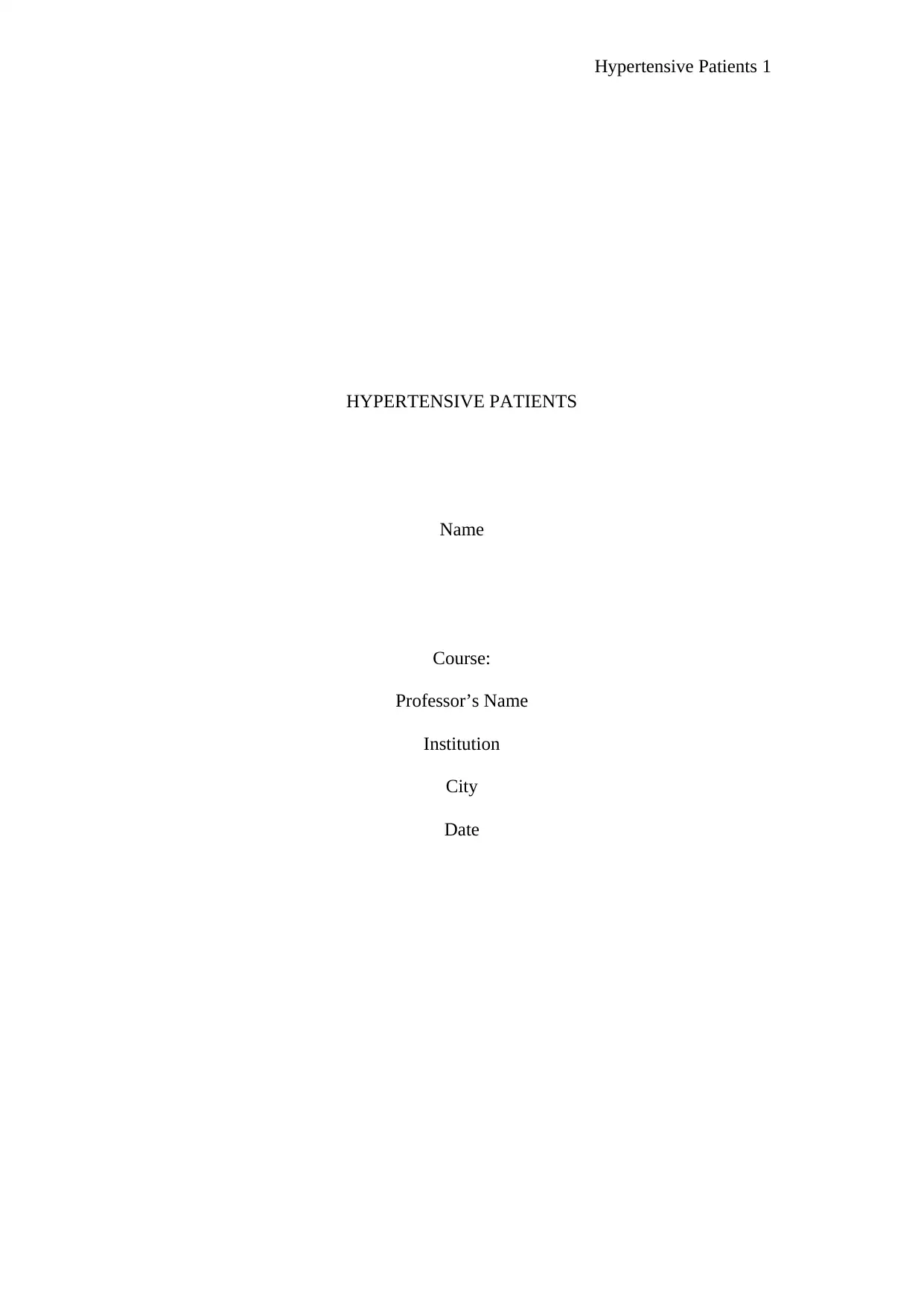
Hypertensive Patients 1
HYPERTENSIVE PATIENTS
Name
Course:
Professor’s Name
Institution
City
Date
HYPERTENSIVE PATIENTS
Name
Course:
Professor’s Name
Institution
City
Date
Paraphrase This Document
Need a fresh take? Get an instant paraphrase of this document with our AI Paraphraser
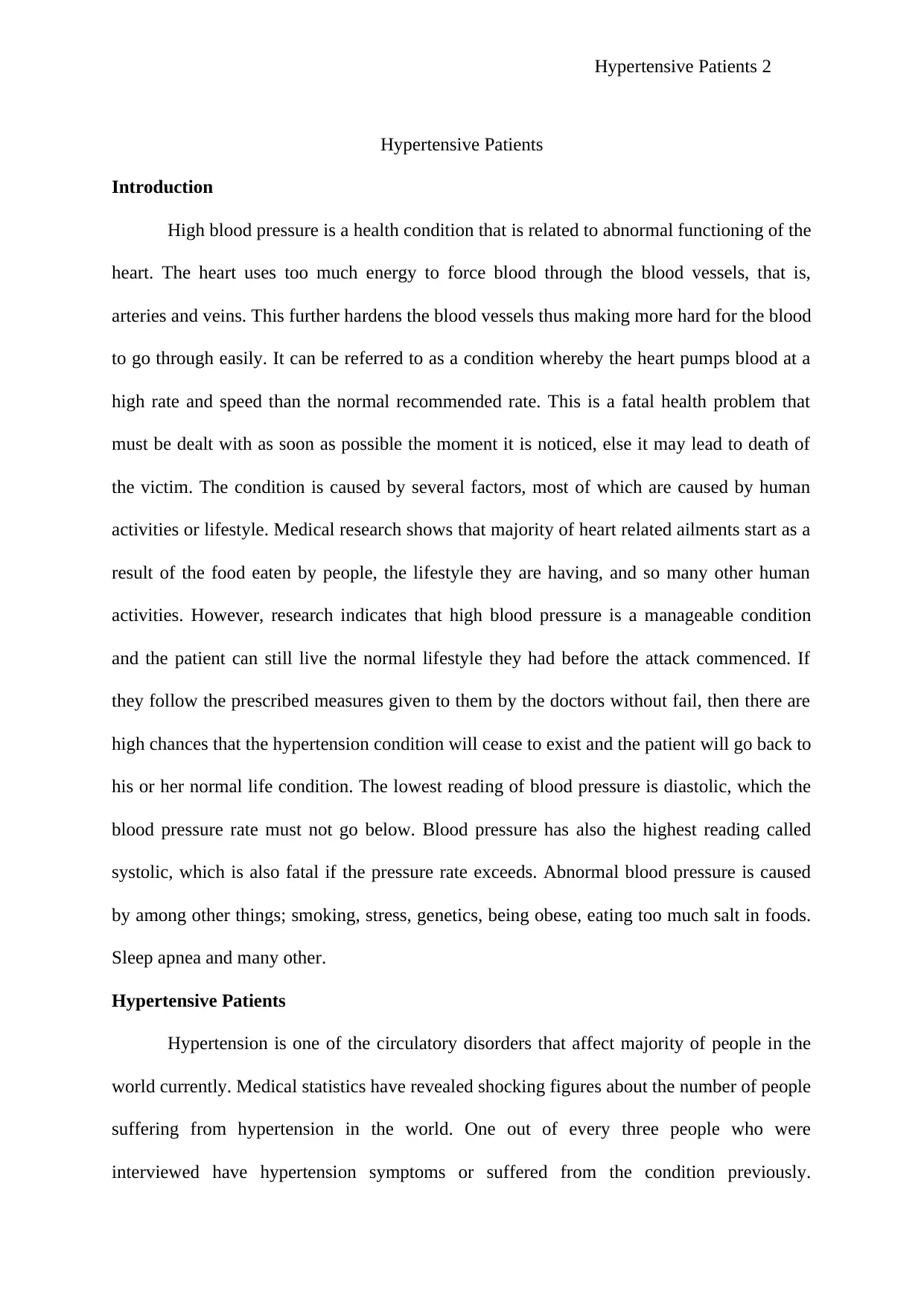
Hypertensive Patients 2
Hypertensive Patients
Introduction
High blood pressure is a health condition that is related to abnormal functioning of the
heart. The heart uses too much energy to force blood through the blood vessels, that is,
arteries and veins. This further hardens the blood vessels thus making more hard for the blood
to go through easily. It can be referred to as a condition whereby the heart pumps blood at a
high rate and speed than the normal recommended rate. This is a fatal health problem that
must be dealt with as soon as possible the moment it is noticed, else it may lead to death of
the victim. The condition is caused by several factors, most of which are caused by human
activities or lifestyle. Medical research shows that majority of heart related ailments start as a
result of the food eaten by people, the lifestyle they are having, and so many other human
activities. However, research indicates that high blood pressure is a manageable condition
and the patient can still live the normal lifestyle they had before the attack commenced. If
they follow the prescribed measures given to them by the doctors without fail, then there are
high chances that the hypertension condition will cease to exist and the patient will go back to
his or her normal life condition. The lowest reading of blood pressure is diastolic, which the
blood pressure rate must not go below. Blood pressure has also the highest reading called
systolic, which is also fatal if the pressure rate exceeds. Abnormal blood pressure is caused
by among other things; smoking, stress, genetics, being obese, eating too much salt in foods.
Sleep apnea and many other.
Hypertensive Patients
Hypertension is one of the circulatory disorders that affect majority of people in the
world currently. Medical statistics have revealed shocking figures about the number of people
suffering from hypertension in the world. One out of every three people who were
interviewed have hypertension symptoms or suffered from the condition previously.
Hypertensive Patients
Introduction
High blood pressure is a health condition that is related to abnormal functioning of the
heart. The heart uses too much energy to force blood through the blood vessels, that is,
arteries and veins. This further hardens the blood vessels thus making more hard for the blood
to go through easily. It can be referred to as a condition whereby the heart pumps blood at a
high rate and speed than the normal recommended rate. This is a fatal health problem that
must be dealt with as soon as possible the moment it is noticed, else it may lead to death of
the victim. The condition is caused by several factors, most of which are caused by human
activities or lifestyle. Medical research shows that majority of heart related ailments start as a
result of the food eaten by people, the lifestyle they are having, and so many other human
activities. However, research indicates that high blood pressure is a manageable condition
and the patient can still live the normal lifestyle they had before the attack commenced. If
they follow the prescribed measures given to them by the doctors without fail, then there are
high chances that the hypertension condition will cease to exist and the patient will go back to
his or her normal life condition. The lowest reading of blood pressure is diastolic, which the
blood pressure rate must not go below. Blood pressure has also the highest reading called
systolic, which is also fatal if the pressure rate exceeds. Abnormal blood pressure is caused
by among other things; smoking, stress, genetics, being obese, eating too much salt in foods.
Sleep apnea and many other.
Hypertensive Patients
Hypertension is one of the circulatory disorders that affect majority of people in the
world currently. Medical statistics have revealed shocking figures about the number of people
suffering from hypertension in the world. One out of every three people who were
interviewed have hypertension symptoms or suffered from the condition previously.
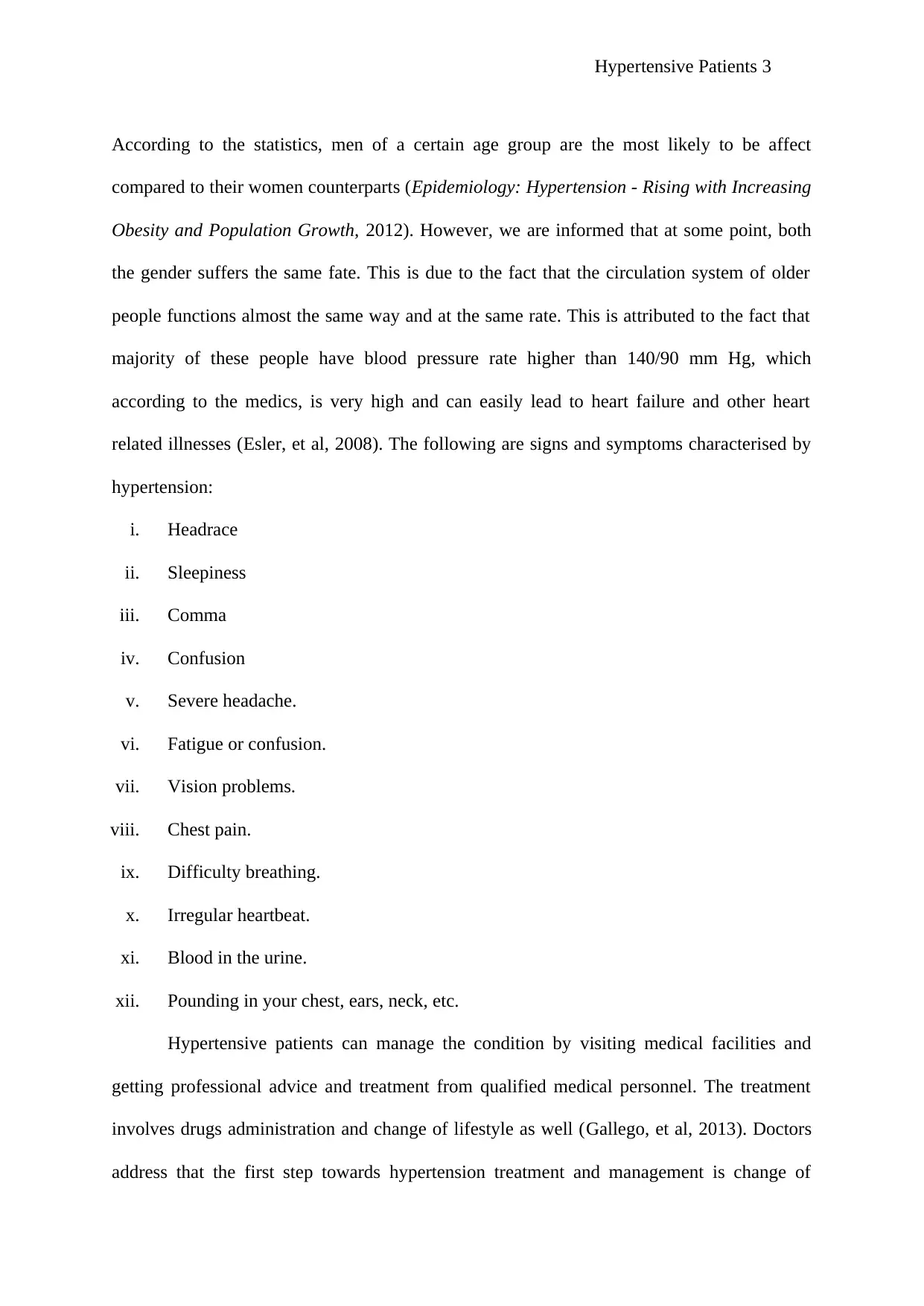
Hypertensive Patients 3
According to the statistics, men of a certain age group are the most likely to be affect
compared to their women counterparts (Epidemiology: Hypertension - Rising with Increasing
Obesity and Population Growth, 2012). However, we are informed that at some point, both
the gender suffers the same fate. This is due to the fact that the circulation system of older
people functions almost the same way and at the same rate. This is attributed to the fact that
majority of these people have blood pressure rate higher than 140/90 mm Hg, which
according to the medics, is very high and can easily lead to heart failure and other heart
related illnesses (Esler, et al, 2008). The following are signs and symptoms characterised by
hypertension:
i. Headrace
ii. Sleepiness
iii. Comma
iv. Confusion
v. Severe headache.
vi. Fatigue or confusion.
vii. Vision problems.
viii. Chest pain.
ix. Difficulty breathing.
x. Irregular heartbeat.
xi. Blood in the urine.
xii. Pounding in your chest, ears, neck, etc.
Hypertensive patients can manage the condition by visiting medical facilities and
getting professional advice and treatment from qualified medical personnel. The treatment
involves drugs administration and change of lifestyle as well (Gallego, et al, 2013). Doctors
address that the first step towards hypertension treatment and management is change of
According to the statistics, men of a certain age group are the most likely to be affect
compared to their women counterparts (Epidemiology: Hypertension - Rising with Increasing
Obesity and Population Growth, 2012). However, we are informed that at some point, both
the gender suffers the same fate. This is due to the fact that the circulation system of older
people functions almost the same way and at the same rate. This is attributed to the fact that
majority of these people have blood pressure rate higher than 140/90 mm Hg, which
according to the medics, is very high and can easily lead to heart failure and other heart
related illnesses (Esler, et al, 2008). The following are signs and symptoms characterised by
hypertension:
i. Headrace
ii. Sleepiness
iii. Comma
iv. Confusion
v. Severe headache.
vi. Fatigue or confusion.
vii. Vision problems.
viii. Chest pain.
ix. Difficulty breathing.
x. Irregular heartbeat.
xi. Blood in the urine.
xii. Pounding in your chest, ears, neck, etc.
Hypertensive patients can manage the condition by visiting medical facilities and
getting professional advice and treatment from qualified medical personnel. The treatment
involves drugs administration and change of lifestyle as well (Gallego, et al, 2013). Doctors
address that the first step towards hypertension treatment and management is change of
⊘ This is a preview!⊘
Do you want full access?
Subscribe today to unlock all pages.

Trusted by 1+ million students worldwide
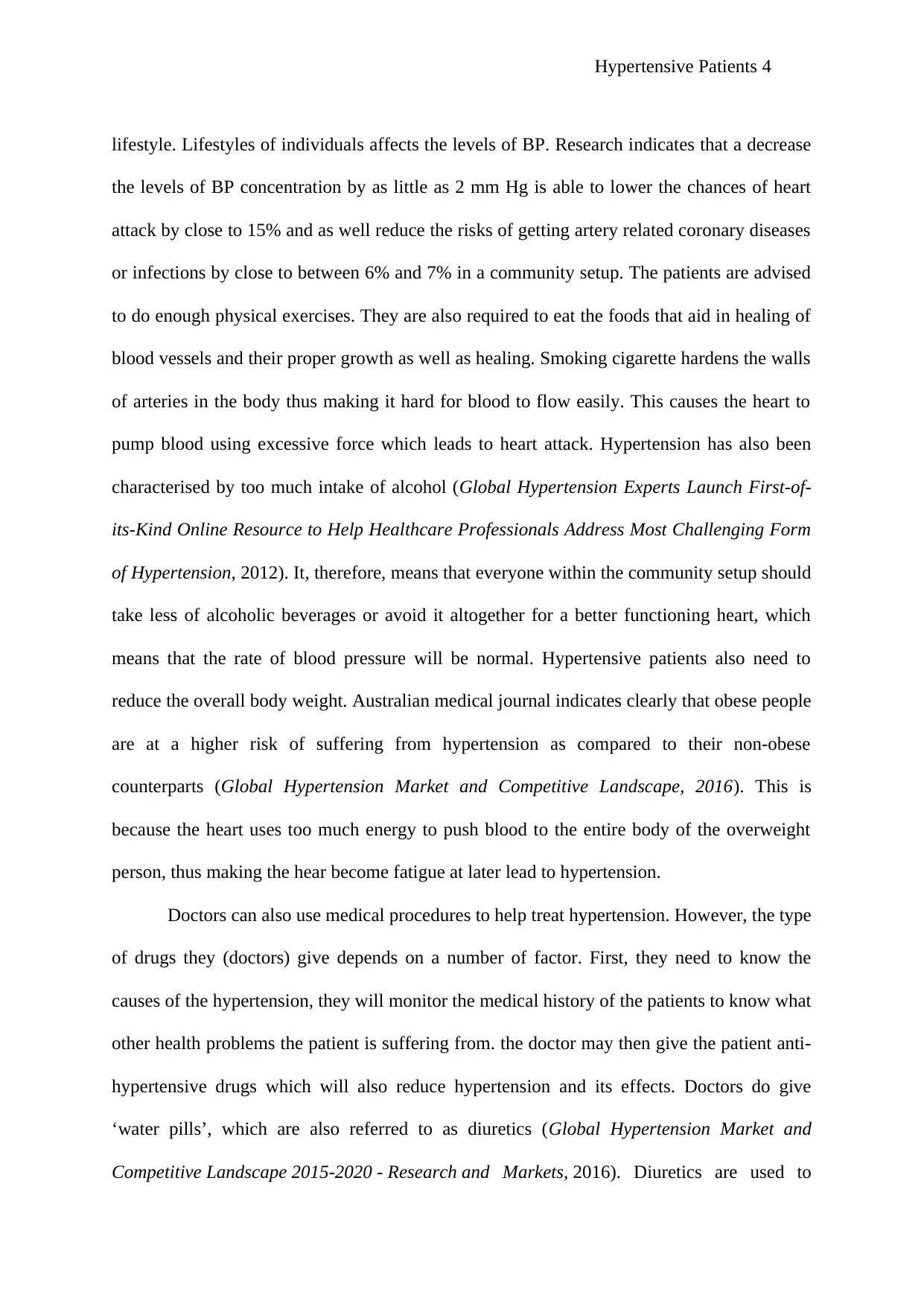
Hypertensive Patients 4
lifestyle. Lifestyles of individuals affects the levels of BP. Research indicates that a decrease
the levels of BP concentration by as little as 2 mm Hg is able to lower the chances of heart
attack by close to 15% and as well reduce the risks of getting artery related coronary diseases
or infections by close to between 6% and 7% in a community setup. The patients are advised
to do enough physical exercises. They are also required to eat the foods that aid in healing of
blood vessels and their proper growth as well as healing. Smoking cigarette hardens the walls
of arteries in the body thus making it hard for blood to flow easily. This causes the heart to
pump blood using excessive force which leads to heart attack. Hypertension has also been
characterised by too much intake of alcohol (Global Hypertension Experts Launch First-of-
its-Kind Online Resource to Help Healthcare Professionals Address Most Challenging Form
of Hypertension, 2012). It, therefore, means that everyone within the community setup should
take less of alcoholic beverages or avoid it altogether for a better functioning heart, which
means that the rate of blood pressure will be normal. Hypertensive patients also need to
reduce the overall body weight. Australian medical journal indicates clearly that obese people
are at a higher risk of suffering from hypertension as compared to their non-obese
counterparts (Global Hypertension Market and Competitive Landscape, 2016). This is
because the heart uses too much energy to push blood to the entire body of the overweight
person, thus making the hear become fatigue at later lead to hypertension.
Doctors can also use medical procedures to help treat hypertension. However, the type
of drugs they (doctors) give depends on a number of factor. First, they need to know the
causes of the hypertension, they will monitor the medical history of the patients to know what
other health problems the patient is suffering from. the doctor may then give the patient anti-
hypertensive drugs which will also reduce hypertension and its effects. Doctors do give
‘water pills’, which are also referred to as diuretics (Global Hypertension Market and
Competitive Landscape 2015-2020 - Research and Markets, 2016). Diuretics are used to
lifestyle. Lifestyles of individuals affects the levels of BP. Research indicates that a decrease
the levels of BP concentration by as little as 2 mm Hg is able to lower the chances of heart
attack by close to 15% and as well reduce the risks of getting artery related coronary diseases
or infections by close to between 6% and 7% in a community setup. The patients are advised
to do enough physical exercises. They are also required to eat the foods that aid in healing of
blood vessels and their proper growth as well as healing. Smoking cigarette hardens the walls
of arteries in the body thus making it hard for blood to flow easily. This causes the heart to
pump blood using excessive force which leads to heart attack. Hypertension has also been
characterised by too much intake of alcohol (Global Hypertension Experts Launch First-of-
its-Kind Online Resource to Help Healthcare Professionals Address Most Challenging Form
of Hypertension, 2012). It, therefore, means that everyone within the community setup should
take less of alcoholic beverages or avoid it altogether for a better functioning heart, which
means that the rate of blood pressure will be normal. Hypertensive patients also need to
reduce the overall body weight. Australian medical journal indicates clearly that obese people
are at a higher risk of suffering from hypertension as compared to their non-obese
counterparts (Global Hypertension Market and Competitive Landscape, 2016). This is
because the heart uses too much energy to push blood to the entire body of the overweight
person, thus making the hear become fatigue at later lead to hypertension.
Doctors can also use medical procedures to help treat hypertension. However, the type
of drugs they (doctors) give depends on a number of factor. First, they need to know the
causes of the hypertension, they will monitor the medical history of the patients to know what
other health problems the patient is suffering from. the doctor may then give the patient anti-
hypertensive drugs which will also reduce hypertension and its effects. Doctors do give
‘water pills’, which are also referred to as diuretics (Global Hypertension Market and
Competitive Landscape 2015-2020 - Research and Markets, 2016). Diuretics are used to
Paraphrase This Document
Need a fresh take? Get an instant paraphrase of this document with our AI Paraphraser
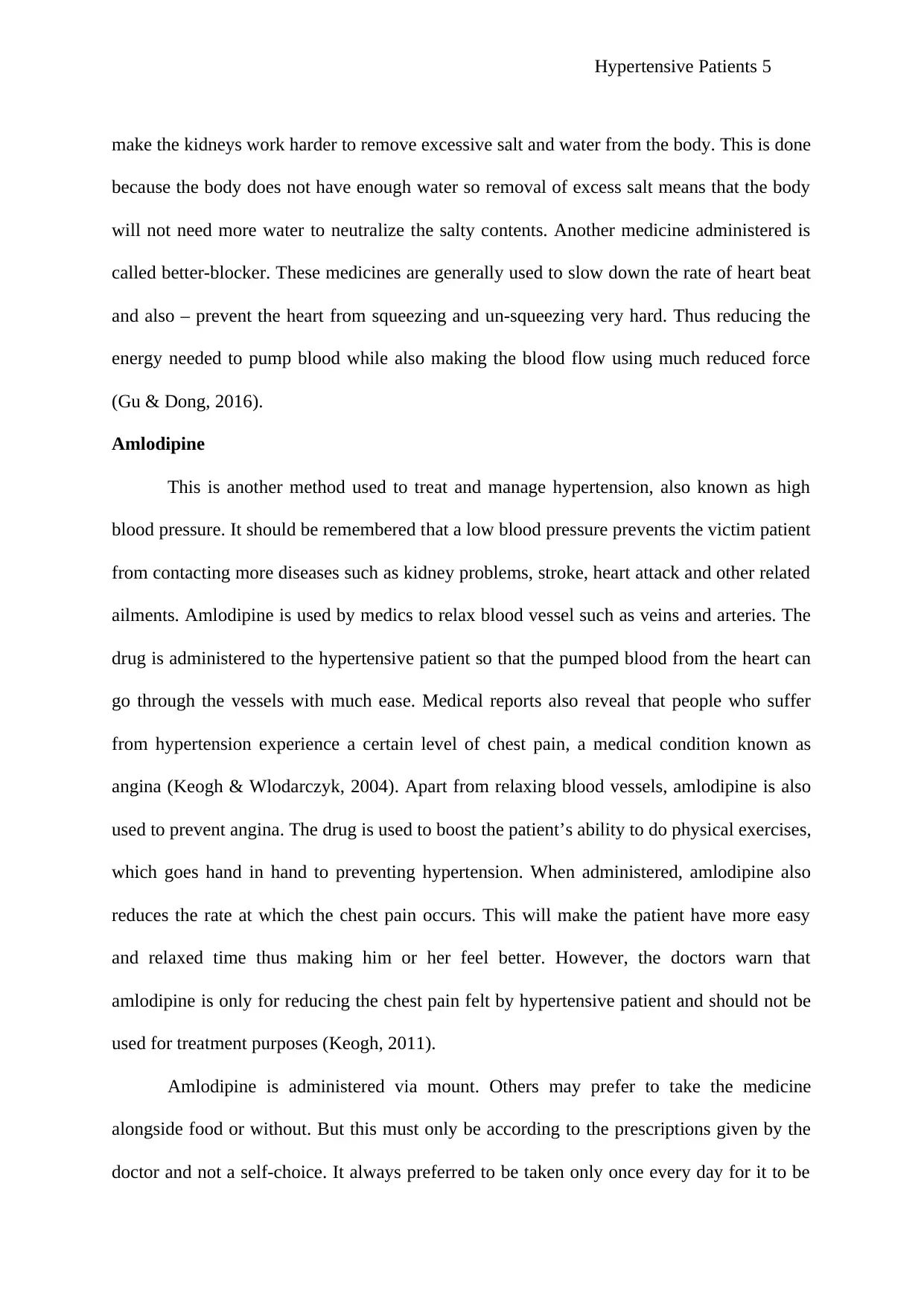
Hypertensive Patients 5
make the kidneys work harder to remove excessive salt and water from the body. This is done
because the body does not have enough water so removal of excess salt means that the body
will not need more water to neutralize the salty contents. Another medicine administered is
called better-blocker. These medicines are generally used to slow down the rate of heart beat
and also – prevent the heart from squeezing and un-squeezing very hard. Thus reducing the
energy needed to pump blood while also making the blood flow using much reduced force
(Gu & Dong, 2016).
Amlodipine
This is another method used to treat and manage hypertension, also known as high
blood pressure. It should be remembered that a low blood pressure prevents the victim patient
from contacting more diseases such as kidney problems, stroke, heart attack and other related
ailments. Amlodipine is used by medics to relax blood vessel such as veins and arteries. The
drug is administered to the hypertensive patient so that the pumped blood from the heart can
go through the vessels with much ease. Medical reports also reveal that people who suffer
from hypertension experience a certain level of chest pain, a medical condition known as
angina (Keogh & Wlodarczyk, 2004). Apart from relaxing blood vessels, amlodipine is also
used to prevent angina. The drug is used to boost the patient’s ability to do physical exercises,
which goes hand in hand to preventing hypertension. When administered, amlodipine also
reduces the rate at which the chest pain occurs. This will make the patient have more easy
and relaxed time thus making him or her feel better. However, the doctors warn that
amlodipine is only for reducing the chest pain felt by hypertensive patient and should not be
used for treatment purposes (Keogh, 2011).
Amlodipine is administered via mount. Others may prefer to take the medicine
alongside food or without. But this must only be according to the prescriptions given by the
doctor and not a self-choice. It always preferred to be taken only once every day for it to be
make the kidneys work harder to remove excessive salt and water from the body. This is done
because the body does not have enough water so removal of excess salt means that the body
will not need more water to neutralize the salty contents. Another medicine administered is
called better-blocker. These medicines are generally used to slow down the rate of heart beat
and also – prevent the heart from squeezing and un-squeezing very hard. Thus reducing the
energy needed to pump blood while also making the blood flow using much reduced force
(Gu & Dong, 2016).
Amlodipine
This is another method used to treat and manage hypertension, also known as high
blood pressure. It should be remembered that a low blood pressure prevents the victim patient
from contacting more diseases such as kidney problems, stroke, heart attack and other related
ailments. Amlodipine is used by medics to relax blood vessel such as veins and arteries. The
drug is administered to the hypertensive patient so that the pumped blood from the heart can
go through the vessels with much ease. Medical reports also reveal that people who suffer
from hypertension experience a certain level of chest pain, a medical condition known as
angina (Keogh & Wlodarczyk, 2004). Apart from relaxing blood vessels, amlodipine is also
used to prevent angina. The drug is used to boost the patient’s ability to do physical exercises,
which goes hand in hand to preventing hypertension. When administered, amlodipine also
reduces the rate at which the chest pain occurs. This will make the patient have more easy
and relaxed time thus making him or her feel better. However, the doctors warn that
amlodipine is only for reducing the chest pain felt by hypertensive patient and should not be
used for treatment purposes (Keogh, 2011).
Amlodipine is administered via mount. Others may prefer to take the medicine
alongside food or without. But this must only be according to the prescriptions given by the
doctor and not a self-choice. It always preferred to be taken only once every day for it to be
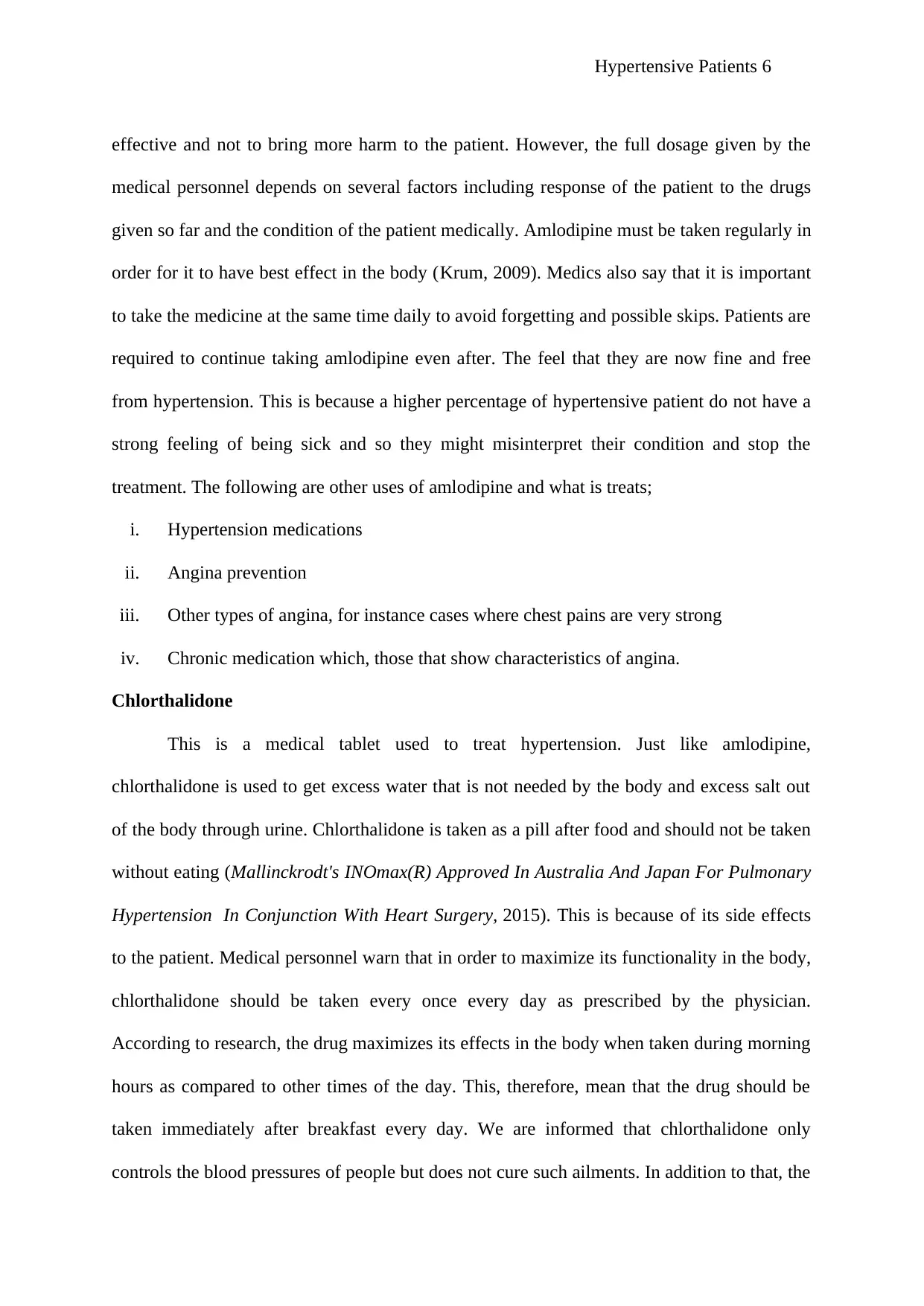
Hypertensive Patients 6
effective and not to bring more harm to the patient. However, the full dosage given by the
medical personnel depends on several factors including response of the patient to the drugs
given so far and the condition of the patient medically. Amlodipine must be taken regularly in
order for it to have best effect in the body (Krum, 2009). Medics also say that it is important
to take the medicine at the same time daily to avoid forgetting and possible skips. Patients are
required to continue taking amlodipine even after. The feel that they are now fine and free
from hypertension. This is because a higher percentage of hypertensive patient do not have a
strong feeling of being sick and so they might misinterpret their condition and stop the
treatment. The following are other uses of amlodipine and what is treats;
i. Hypertension medications
ii. Angina prevention
iii. Other types of angina, for instance cases where chest pains are very strong
iv. Chronic medication which, those that show characteristics of angina.
Chlorthalidone
This is a medical tablet used to treat hypertension. Just like amlodipine,
chlorthalidone is used to get excess water that is not needed by the body and excess salt out
of the body through urine. Chlorthalidone is taken as a pill after food and should not be taken
without eating (Mallinckrodt's INOmax(R) Approved In Australia And Japan For Pulmonary
Hypertension In Conjunction With Heart Surgery, 2015). This is because of its side effects
to the patient. Medical personnel warn that in order to maximize its functionality in the body,
chlorthalidone should be taken every once every day as prescribed by the physician.
According to research, the drug maximizes its effects in the body when taken during morning
hours as compared to other times of the day. This, therefore, mean that the drug should be
taken immediately after breakfast every day. We are informed that chlorthalidone only
controls the blood pressures of people but does not cure such ailments. In addition to that, the
effective and not to bring more harm to the patient. However, the full dosage given by the
medical personnel depends on several factors including response of the patient to the drugs
given so far and the condition of the patient medically. Amlodipine must be taken regularly in
order for it to have best effect in the body (Krum, 2009). Medics also say that it is important
to take the medicine at the same time daily to avoid forgetting and possible skips. Patients are
required to continue taking amlodipine even after. The feel that they are now fine and free
from hypertension. This is because a higher percentage of hypertensive patient do not have a
strong feeling of being sick and so they might misinterpret their condition and stop the
treatment. The following are other uses of amlodipine and what is treats;
i. Hypertension medications
ii. Angina prevention
iii. Other types of angina, for instance cases where chest pains are very strong
iv. Chronic medication which, those that show characteristics of angina.
Chlorthalidone
This is a medical tablet used to treat hypertension. Just like amlodipine,
chlorthalidone is used to get excess water that is not needed by the body and excess salt out
of the body through urine. Chlorthalidone is taken as a pill after food and should not be taken
without eating (Mallinckrodt's INOmax(R) Approved In Australia And Japan For Pulmonary
Hypertension In Conjunction With Heart Surgery, 2015). This is because of its side effects
to the patient. Medical personnel warn that in order to maximize its functionality in the body,
chlorthalidone should be taken every once every day as prescribed by the physician.
According to research, the drug maximizes its effects in the body when taken during morning
hours as compared to other times of the day. This, therefore, mean that the drug should be
taken immediately after breakfast every day. We are informed that chlorthalidone only
controls the blood pressures of people but does not cure such ailments. In addition to that, the
⊘ This is a preview!⊘
Do you want full access?
Subscribe today to unlock all pages.

Trusted by 1+ million students worldwide
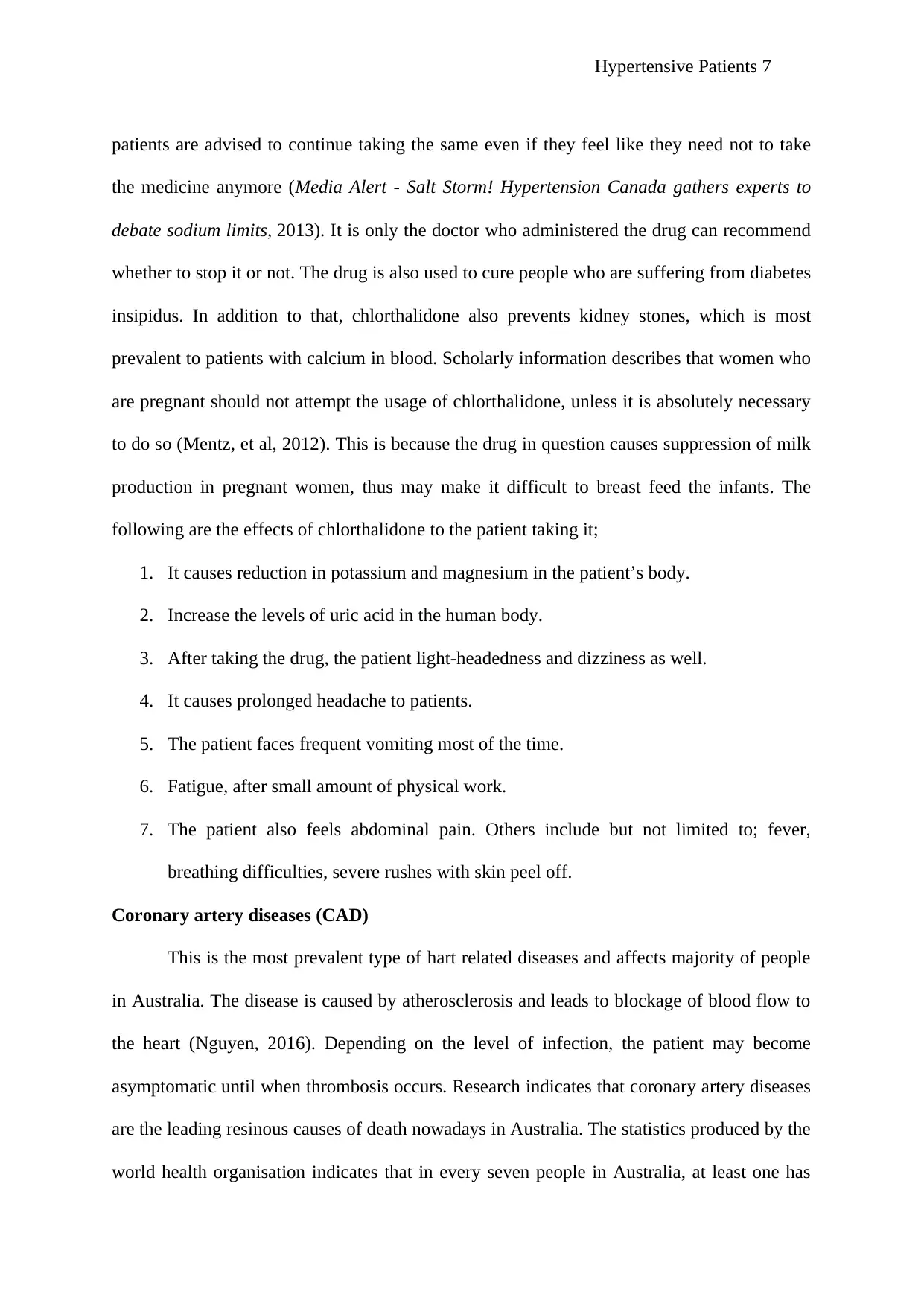
Hypertensive Patients 7
patients are advised to continue taking the same even if they feel like they need not to take
the medicine anymore (Media Alert - Salt Storm! Hypertension Canada gathers experts to
debate sodium limits, 2013). It is only the doctor who administered the drug can recommend
whether to stop it or not. The drug is also used to cure people who are suffering from diabetes
insipidus. In addition to that, chlorthalidone also prevents kidney stones, which is most
prevalent to patients with calcium in blood. Scholarly information describes that women who
are pregnant should not attempt the usage of chlorthalidone, unless it is absolutely necessary
to do so (Mentz, et al, 2012). This is because the drug in question causes suppression of milk
production in pregnant women, thus may make it difficult to breast feed the infants. The
following are the effects of chlorthalidone to the patient taking it;
1. It causes reduction in potassium and magnesium in the patient’s body.
2. Increase the levels of uric acid in the human body.
3. After taking the drug, the patient light-headedness and dizziness as well.
4. It causes prolonged headache to patients.
5. The patient faces frequent vomiting most of the time.
6. Fatigue, after small amount of physical work.
7. The patient also feels abdominal pain. Others include but not limited to; fever,
breathing difficulties, severe rushes with skin peel off.
Coronary artery diseases (CAD)
This is the most prevalent type of hart related diseases and affects majority of people
in Australia. The disease is caused by atherosclerosis and leads to blockage of blood flow to
the heart (Nguyen, 2016). Depending on the level of infection, the patient may become
asymptomatic until when thrombosis occurs. Research indicates that coronary artery diseases
are the leading resinous causes of death nowadays in Australia. The statistics produced by the
world health organisation indicates that in every seven people in Australia, at least one has
patients are advised to continue taking the same even if they feel like they need not to take
the medicine anymore (Media Alert - Salt Storm! Hypertension Canada gathers experts to
debate sodium limits, 2013). It is only the doctor who administered the drug can recommend
whether to stop it or not. The drug is also used to cure people who are suffering from diabetes
insipidus. In addition to that, chlorthalidone also prevents kidney stones, which is most
prevalent to patients with calcium in blood. Scholarly information describes that women who
are pregnant should not attempt the usage of chlorthalidone, unless it is absolutely necessary
to do so (Mentz, et al, 2012). This is because the drug in question causes suppression of milk
production in pregnant women, thus may make it difficult to breast feed the infants. The
following are the effects of chlorthalidone to the patient taking it;
1. It causes reduction in potassium and magnesium in the patient’s body.
2. Increase the levels of uric acid in the human body.
3. After taking the drug, the patient light-headedness and dizziness as well.
4. It causes prolonged headache to patients.
5. The patient faces frequent vomiting most of the time.
6. Fatigue, after small amount of physical work.
7. The patient also feels abdominal pain. Others include but not limited to; fever,
breathing difficulties, severe rushes with skin peel off.
Coronary artery diseases (CAD)
This is the most prevalent type of hart related diseases and affects majority of people
in Australia. The disease is caused by atherosclerosis and leads to blockage of blood flow to
the heart (Nguyen, 2016). Depending on the level of infection, the patient may become
asymptomatic until when thrombosis occurs. Research indicates that coronary artery diseases
are the leading resinous causes of death nowadays in Australia. The statistics produced by the
world health organisation indicates that in every seven people in Australia, at least one has
Paraphrase This Document
Need a fresh take? Get an instant paraphrase of this document with our AI Paraphraser
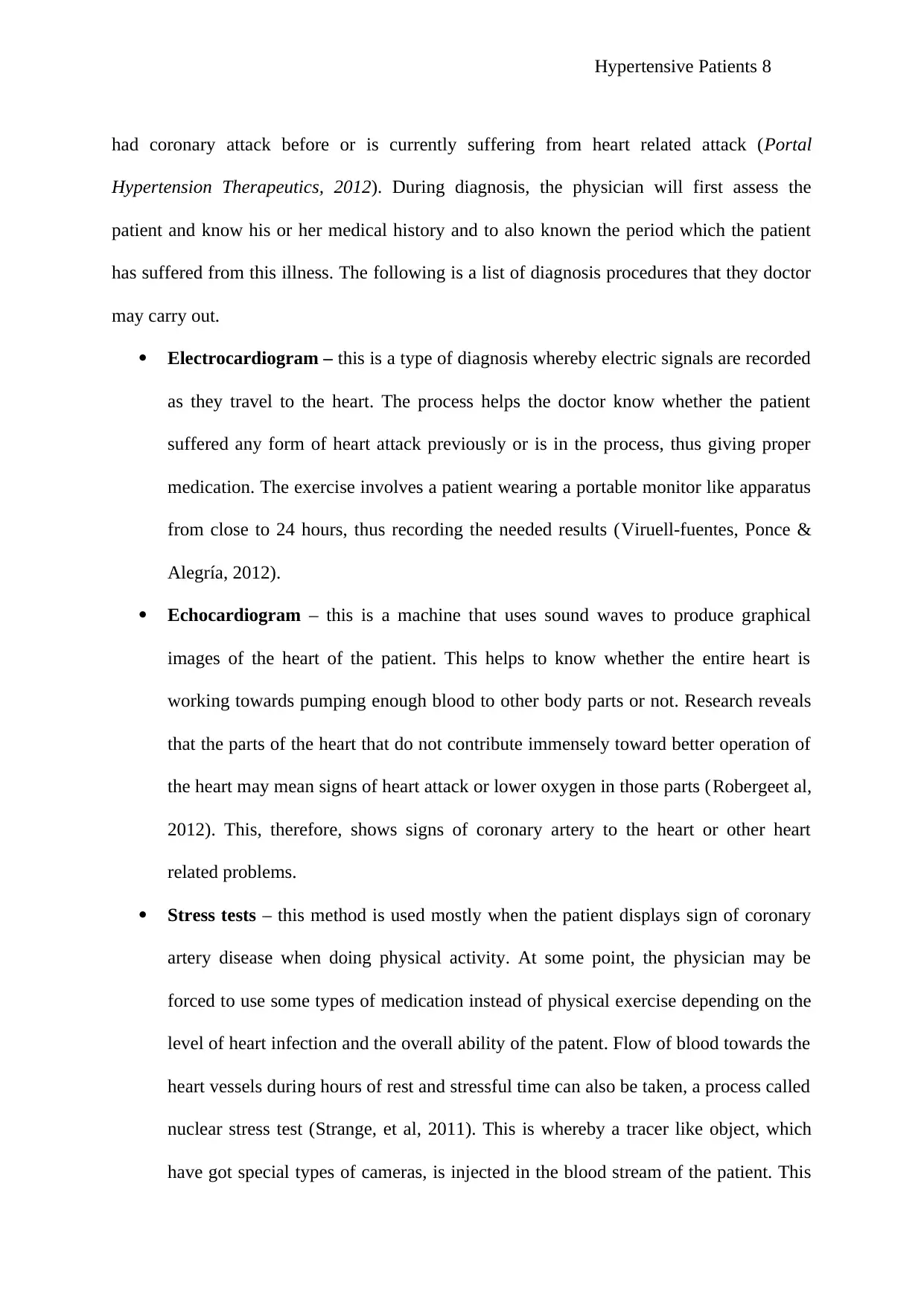
Hypertensive Patients 8
had coronary attack before or is currently suffering from heart related attack (Portal
Hypertension Therapeutics, 2012). During diagnosis, the physician will first assess the
patient and know his or her medical history and to also known the period which the patient
has suffered from this illness. The following is a list of diagnosis procedures that they doctor
may carry out.
Electrocardiogram – this is a type of diagnosis whereby electric signals are recorded
as they travel to the heart. The process helps the doctor know whether the patient
suffered any form of heart attack previously or is in the process, thus giving proper
medication. The exercise involves a patient wearing a portable monitor like apparatus
from close to 24 hours, thus recording the needed results (Viruell-fuentes, Ponce &
Alegría, 2012).
Echocardiogram – this is a machine that uses sound waves to produce graphical
images of the heart of the patient. This helps to know whether the entire heart is
working towards pumping enough blood to other body parts or not. Research reveals
that the parts of the heart that do not contribute immensely toward better operation of
the heart may mean signs of heart attack or lower oxygen in those parts (Robergeet al,
2012). This, therefore, shows signs of coronary artery to the heart or other heart
related problems.
Stress tests – this method is used mostly when the patient displays sign of coronary
artery disease when doing physical activity. At some point, the physician may be
forced to use some types of medication instead of physical exercise depending on the
level of heart infection and the overall ability of the patent. Flow of blood towards the
heart vessels during hours of rest and stressful time can also be taken, a process called
nuclear stress test (Strange, et al, 2011). This is whereby a tracer like object, which
have got special types of cameras, is injected in the blood stream of the patient. This
had coronary attack before or is currently suffering from heart related attack (Portal
Hypertension Therapeutics, 2012). During diagnosis, the physician will first assess the
patient and know his or her medical history and to also known the period which the patient
has suffered from this illness. The following is a list of diagnosis procedures that they doctor
may carry out.
Electrocardiogram – this is a type of diagnosis whereby electric signals are recorded
as they travel to the heart. The process helps the doctor know whether the patient
suffered any form of heart attack previously or is in the process, thus giving proper
medication. The exercise involves a patient wearing a portable monitor like apparatus
from close to 24 hours, thus recording the needed results (Viruell-fuentes, Ponce &
Alegría, 2012).
Echocardiogram – this is a machine that uses sound waves to produce graphical
images of the heart of the patient. This helps to know whether the entire heart is
working towards pumping enough blood to other body parts or not. Research reveals
that the parts of the heart that do not contribute immensely toward better operation of
the heart may mean signs of heart attack or lower oxygen in those parts (Robergeet al,
2012). This, therefore, shows signs of coronary artery to the heart or other heart
related problems.
Stress tests – this method is used mostly when the patient displays sign of coronary
artery disease when doing physical activity. At some point, the physician may be
forced to use some types of medication instead of physical exercise depending on the
level of heart infection and the overall ability of the patent. Flow of blood towards the
heart vessels during hours of rest and stressful time can also be taken, a process called
nuclear stress test (Strange, et al, 2011). This is whereby a tracer like object, which
have got special types of cameras, is injected in the blood stream of the patient. This
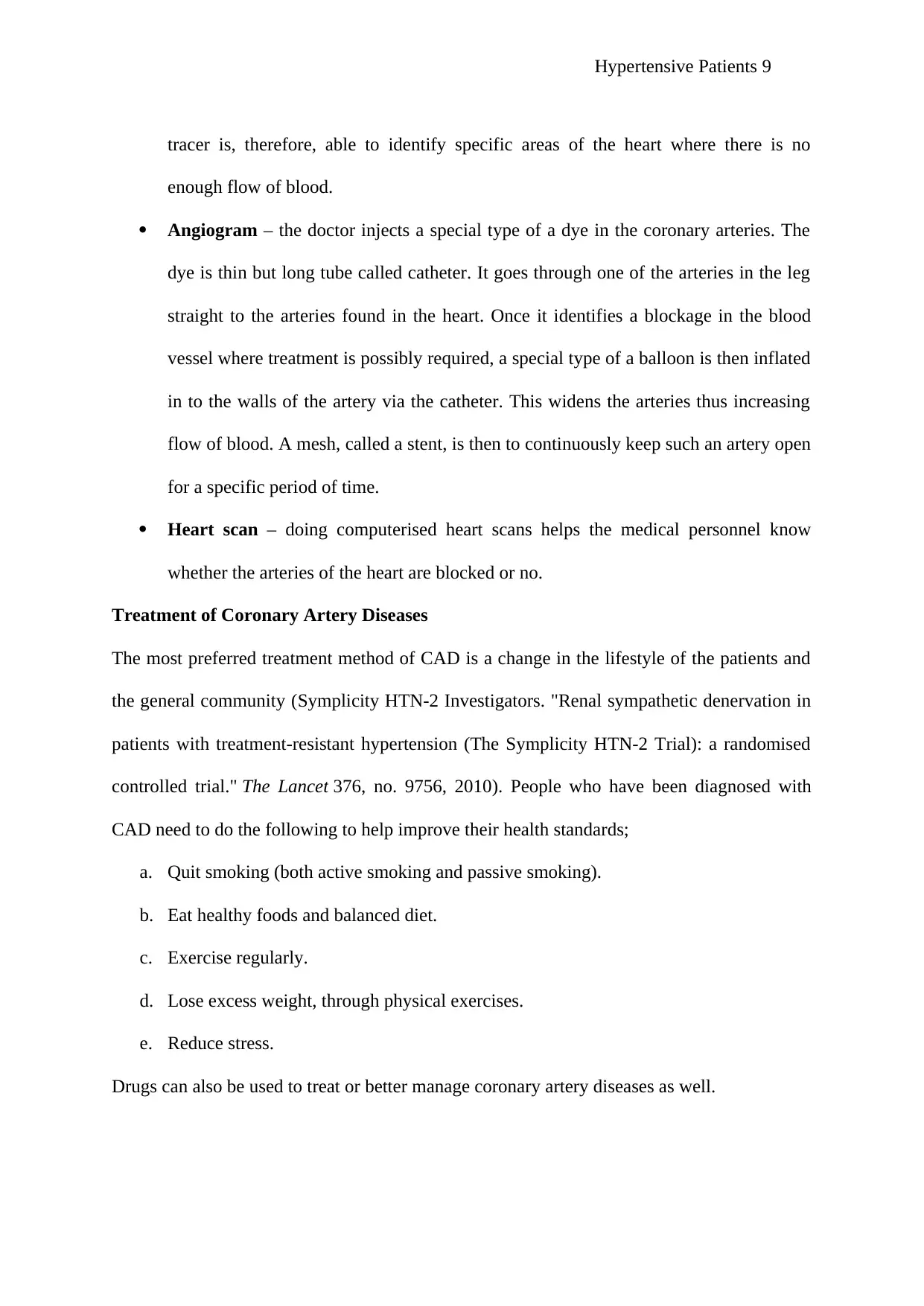
Hypertensive Patients 9
tracer is, therefore, able to identify specific areas of the heart where there is no
enough flow of blood.
Angiogram – the doctor injects a special type of a dye in the coronary arteries. The
dye is thin but long tube called catheter. It goes through one of the arteries in the leg
straight to the arteries found in the heart. Once it identifies a blockage in the blood
vessel where treatment is possibly required, a special type of a balloon is then inflated
in to the walls of the artery via the catheter. This widens the arteries thus increasing
flow of blood. A mesh, called a stent, is then to continuously keep such an artery open
for a specific period of time.
Heart scan – doing computerised heart scans helps the medical personnel know
whether the arteries of the heart are blocked or no.
Treatment of Coronary Artery Diseases
The most preferred treatment method of CAD is a change in the lifestyle of the patients and
the general community (Symplicity HTN-2 Investigators. "Renal sympathetic denervation in
patients with treatment-resistant hypertension (The Symplicity HTN-2 Trial): a randomised
controlled trial." The Lancet 376, no. 9756, 2010). People who have been diagnosed with
CAD need to do the following to help improve their health standards;
a. Quit smoking (both active smoking and passive smoking).
b. Eat healthy foods and balanced diet.
c. Exercise regularly.
d. Lose excess weight, through physical exercises.
e. Reduce stress.
Drugs can also be used to treat or better manage coronary artery diseases as well.
tracer is, therefore, able to identify specific areas of the heart where there is no
enough flow of blood.
Angiogram – the doctor injects a special type of a dye in the coronary arteries. The
dye is thin but long tube called catheter. It goes through one of the arteries in the leg
straight to the arteries found in the heart. Once it identifies a blockage in the blood
vessel where treatment is possibly required, a special type of a balloon is then inflated
in to the walls of the artery via the catheter. This widens the arteries thus increasing
flow of blood. A mesh, called a stent, is then to continuously keep such an artery open
for a specific period of time.
Heart scan – doing computerised heart scans helps the medical personnel know
whether the arteries of the heart are blocked or no.
Treatment of Coronary Artery Diseases
The most preferred treatment method of CAD is a change in the lifestyle of the patients and
the general community (Symplicity HTN-2 Investigators. "Renal sympathetic denervation in
patients with treatment-resistant hypertension (The Symplicity HTN-2 Trial): a randomised
controlled trial." The Lancet 376, no. 9756, 2010). People who have been diagnosed with
CAD need to do the following to help improve their health standards;
a. Quit smoking (both active smoking and passive smoking).
b. Eat healthy foods and balanced diet.
c. Exercise regularly.
d. Lose excess weight, through physical exercises.
e. Reduce stress.
Drugs can also be used to treat or better manage coronary artery diseases as well.
⊘ This is a preview!⊘
Do you want full access?
Subscribe today to unlock all pages.

Trusted by 1+ million students worldwide
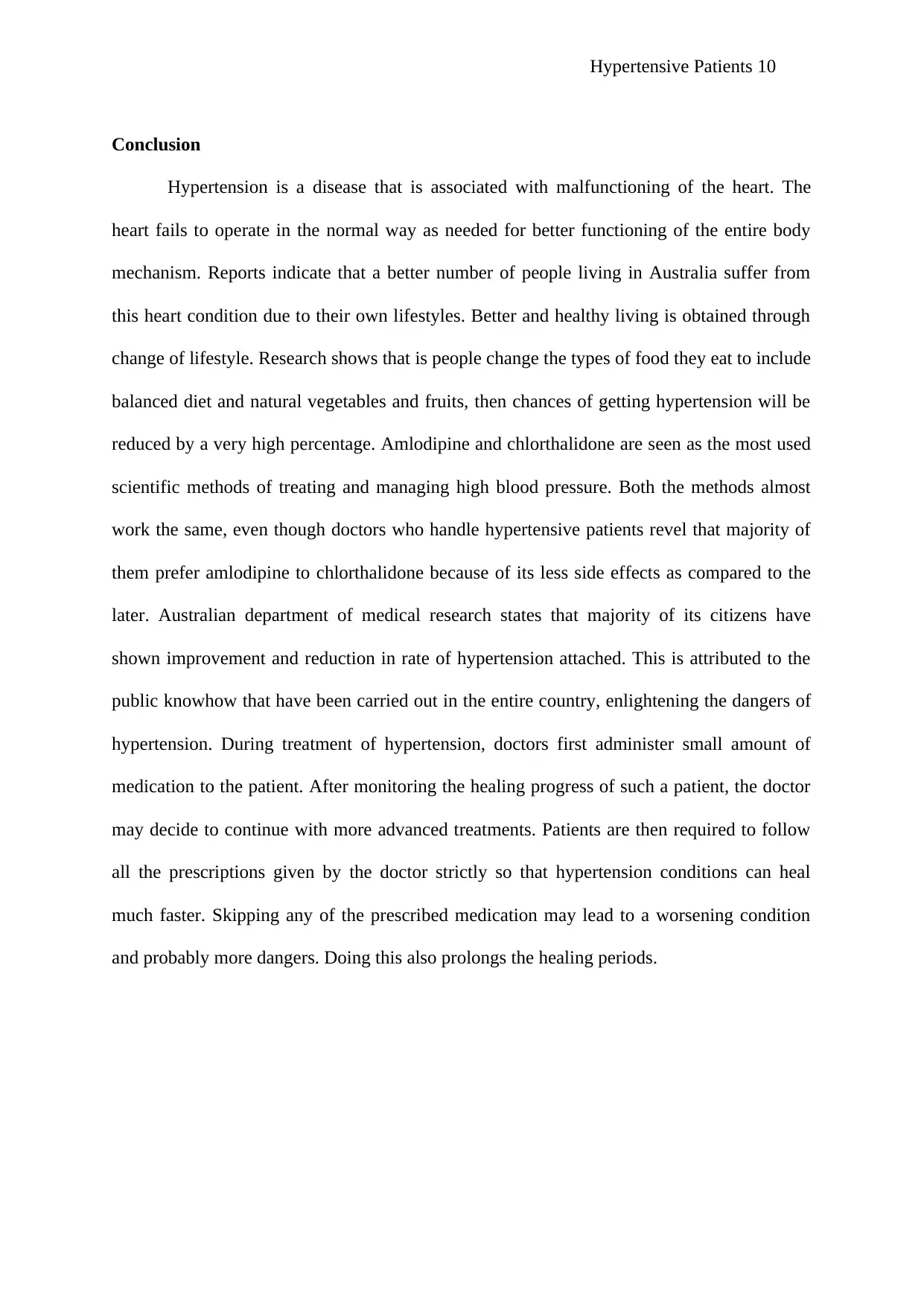
Hypertensive Patients 10
Conclusion
Hypertension is a disease that is associated with malfunctioning of the heart. The
heart fails to operate in the normal way as needed for better functioning of the entire body
mechanism. Reports indicate that a better number of people living in Australia suffer from
this heart condition due to their own lifestyles. Better and healthy living is obtained through
change of lifestyle. Research shows that is people change the types of food they eat to include
balanced diet and natural vegetables and fruits, then chances of getting hypertension will be
reduced by a very high percentage. Amlodipine and chlorthalidone are seen as the most used
scientific methods of treating and managing high blood pressure. Both the methods almost
work the same, even though doctors who handle hypertensive patients revel that majority of
them prefer amlodipine to chlorthalidone because of its less side effects as compared to the
later. Australian department of medical research states that majority of its citizens have
shown improvement and reduction in rate of hypertension attached. This is attributed to the
public knowhow that have been carried out in the entire country, enlightening the dangers of
hypertension. During treatment of hypertension, doctors first administer small amount of
medication to the patient. After monitoring the healing progress of such a patient, the doctor
may decide to continue with more advanced treatments. Patients are then required to follow
all the prescriptions given by the doctor strictly so that hypertension conditions can heal
much faster. Skipping any of the prescribed medication may lead to a worsening condition
and probably more dangers. Doing this also prolongs the healing periods.
Conclusion
Hypertension is a disease that is associated with malfunctioning of the heart. The
heart fails to operate in the normal way as needed for better functioning of the entire body
mechanism. Reports indicate that a better number of people living in Australia suffer from
this heart condition due to their own lifestyles. Better and healthy living is obtained through
change of lifestyle. Research shows that is people change the types of food they eat to include
balanced diet and natural vegetables and fruits, then chances of getting hypertension will be
reduced by a very high percentage. Amlodipine and chlorthalidone are seen as the most used
scientific methods of treating and managing high blood pressure. Both the methods almost
work the same, even though doctors who handle hypertensive patients revel that majority of
them prefer amlodipine to chlorthalidone because of its less side effects as compared to the
later. Australian department of medical research states that majority of its citizens have
shown improvement and reduction in rate of hypertension attached. This is attributed to the
public knowhow that have been carried out in the entire country, enlightening the dangers of
hypertension. During treatment of hypertension, doctors first administer small amount of
medication to the patient. After monitoring the healing progress of such a patient, the doctor
may decide to continue with more advanced treatments. Patients are then required to follow
all the prescriptions given by the doctor strictly so that hypertension conditions can heal
much faster. Skipping any of the prescribed medication may lead to a worsening condition
and probably more dangers. Doing this also prolongs the healing periods.
Paraphrase This Document
Need a fresh take? Get an instant paraphrase of this document with our AI Paraphraser
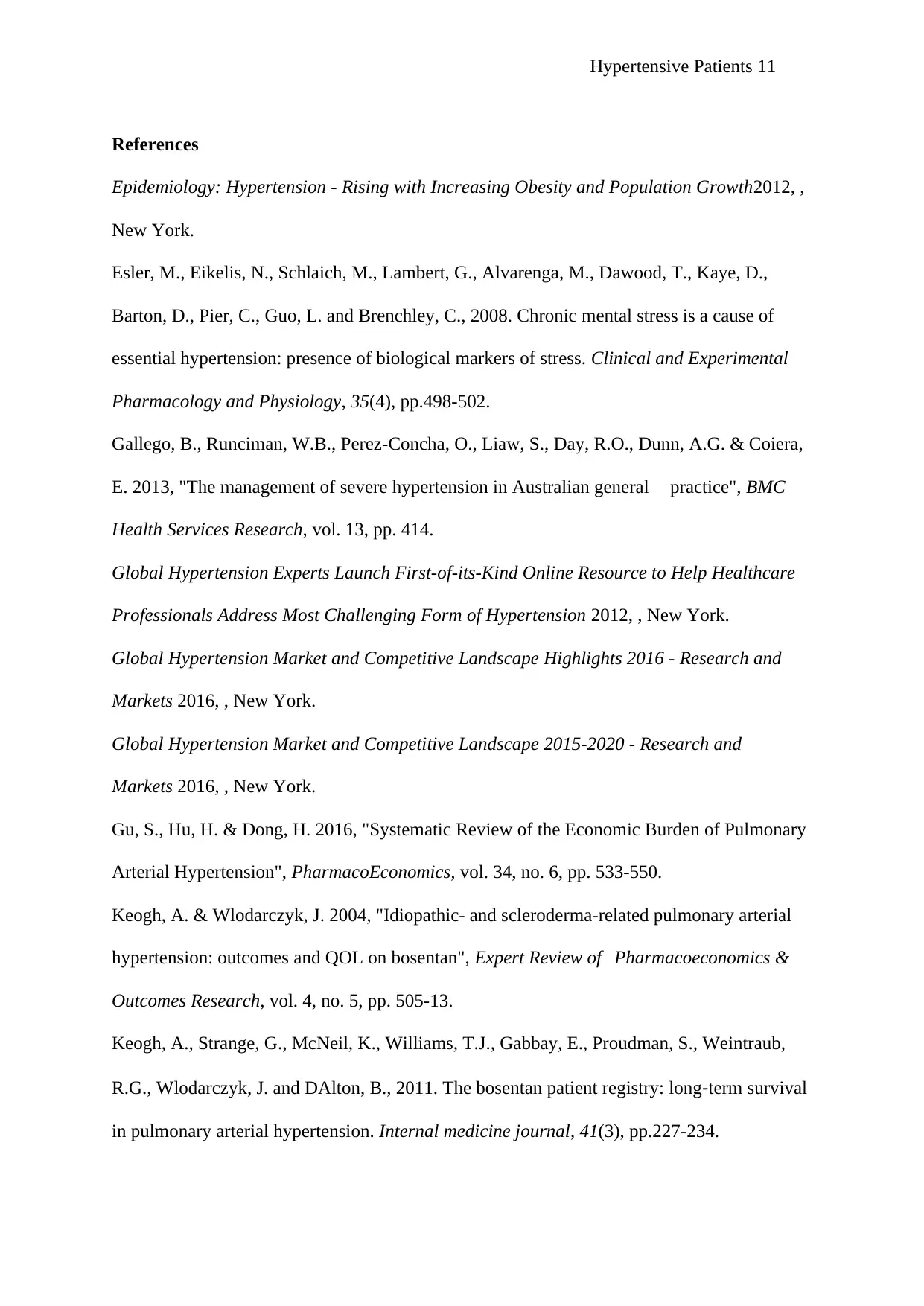
Hypertensive Patients 11
References
Epidemiology: Hypertension - Rising with Increasing Obesity and Population Growth2012, ,
New York.
Esler, M., Eikelis, N., Schlaich, M., Lambert, G., Alvarenga, M., Dawood, T., Kaye, D.,
Barton, D., Pier, C., Guo, L. and Brenchley, C., 2008. Chronic mental stress is a cause of
essential hypertension: presence of biological markers of stress. Clinical and Experimental
Pharmacology and Physiology, 35(4), pp.498-502.
Gallego, B., Runciman, W.B., Perez-Concha, O., Liaw, S., Day, R.O., Dunn, A.G. & Coiera,
E. 2013, "The management of severe hypertension in Australian general practice", BMC
Health Services Research, vol. 13, pp. 414.
Global Hypertension Experts Launch First-of-its-Kind Online Resource to Help Healthcare
Professionals Address Most Challenging Form of Hypertension 2012, , New York.
Global Hypertension Market and Competitive Landscape Highlights 2016 - Research and
Markets 2016, , New York.
Global Hypertension Market and Competitive Landscape 2015-2020 - Research and
Markets 2016, , New York.
Gu, S., Hu, H. & Dong, H. 2016, "Systematic Review of the Economic Burden of Pulmonary
Arterial Hypertension", PharmacoEconomics, vol. 34, no. 6, pp. 533-550.
Keogh, A. & Wlodarczyk, J. 2004, "Idiopathic- and scleroderma-related pulmonary arterial
hypertension: outcomes and QOL on bosentan", Expert Review of Pharmacoeconomics &
Outcomes Research, vol. 4, no. 5, pp. 505-13.
Keogh, A., Strange, G., McNeil, K., Williams, T.J., Gabbay, E., Proudman, S., Weintraub,
R.G., Wlodarczyk, J. and DAlton, B., 2011. The bosentan patient registry: long‐term survival
in pulmonary arterial hypertension. Internal medicine journal, 41(3), pp.227-234.
References
Epidemiology: Hypertension - Rising with Increasing Obesity and Population Growth2012, ,
New York.
Esler, M., Eikelis, N., Schlaich, M., Lambert, G., Alvarenga, M., Dawood, T., Kaye, D.,
Barton, D., Pier, C., Guo, L. and Brenchley, C., 2008. Chronic mental stress is a cause of
essential hypertension: presence of biological markers of stress. Clinical and Experimental
Pharmacology and Physiology, 35(4), pp.498-502.
Gallego, B., Runciman, W.B., Perez-Concha, O., Liaw, S., Day, R.O., Dunn, A.G. & Coiera,
E. 2013, "The management of severe hypertension in Australian general practice", BMC
Health Services Research, vol. 13, pp. 414.
Global Hypertension Experts Launch First-of-its-Kind Online Resource to Help Healthcare
Professionals Address Most Challenging Form of Hypertension 2012, , New York.
Global Hypertension Market and Competitive Landscape Highlights 2016 - Research and
Markets 2016, , New York.
Global Hypertension Market and Competitive Landscape 2015-2020 - Research and
Markets 2016, , New York.
Gu, S., Hu, H. & Dong, H. 2016, "Systematic Review of the Economic Burden of Pulmonary
Arterial Hypertension", PharmacoEconomics, vol. 34, no. 6, pp. 533-550.
Keogh, A. & Wlodarczyk, J. 2004, "Idiopathic- and scleroderma-related pulmonary arterial
hypertension: outcomes and QOL on bosentan", Expert Review of Pharmacoeconomics &
Outcomes Research, vol. 4, no. 5, pp. 505-13.
Keogh, A., Strange, G., McNeil, K., Williams, T.J., Gabbay, E., Proudman, S., Weintraub,
R.G., Wlodarczyk, J. and DAlton, B., 2011. The bosentan patient registry: long‐term survival
in pulmonary arterial hypertension. Internal medicine journal, 41(3), pp.227-234.
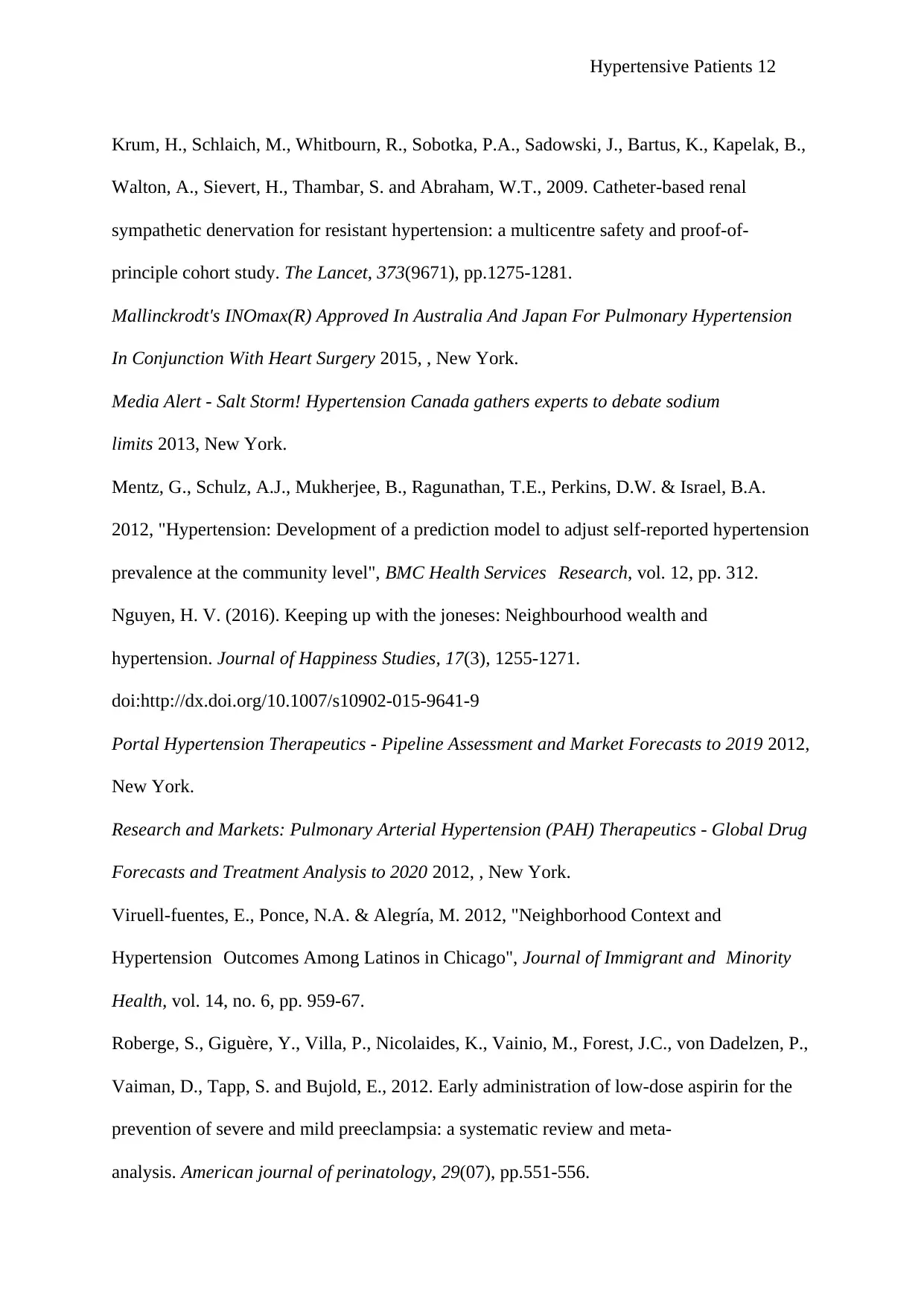
Hypertensive Patients 12
Krum, H., Schlaich, M., Whitbourn, R., Sobotka, P.A., Sadowski, J., Bartus, K., Kapelak, B.,
Walton, A., Sievert, H., Thambar, S. and Abraham, W.T., 2009. Catheter-based renal
sympathetic denervation for resistant hypertension: a multicentre safety and proof-of-
principle cohort study. The Lancet, 373(9671), pp.1275-1281.
Mallinckrodt's INOmax(R) Approved In Australia And Japan For Pulmonary Hypertension
In Conjunction With Heart Surgery 2015, , New York.
Media Alert - Salt Storm! Hypertension Canada gathers experts to debate sodium
limits 2013, New York.
Mentz, G., Schulz, A.J., Mukherjee, B., Ragunathan, T.E., Perkins, D.W. & Israel, B.A.
2012, "Hypertension: Development of a prediction model to adjust self-reported hypertension
prevalence at the community level", BMC Health Services Research, vol. 12, pp. 312.
Nguyen, H. V. (2016). Keeping up with the joneses: Neighbourhood wealth and
hypertension. Journal of Happiness Studies, 17(3), 1255-1271.
doi:http://dx.doi.org/10.1007/s10902-015-9641-9
Portal Hypertension Therapeutics - Pipeline Assessment and Market Forecasts to 2019 2012,
New York.
Research and Markets: Pulmonary Arterial Hypertension (PAH) Therapeutics - Global Drug
Forecasts and Treatment Analysis to 2020 2012, , New York.
Viruell-fuentes, E., Ponce, N.A. & Alegría, M. 2012, "Neighborhood Context and
Hypertension Outcomes Among Latinos in Chicago", Journal of Immigrant and Minority
Health, vol. 14, no. 6, pp. 959-67.
Roberge, S., Giguère, Y., Villa, P., Nicolaides, K., Vainio, M., Forest, J.C., von Dadelzen, P.,
Vaiman, D., Tapp, S. and Bujold, E., 2012. Early administration of low-dose aspirin for the
prevention of severe and mild preeclampsia: a systematic review and meta-
analysis. American journal of perinatology, 29(07), pp.551-556.
Krum, H., Schlaich, M., Whitbourn, R., Sobotka, P.A., Sadowski, J., Bartus, K., Kapelak, B.,
Walton, A., Sievert, H., Thambar, S. and Abraham, W.T., 2009. Catheter-based renal
sympathetic denervation for resistant hypertension: a multicentre safety and proof-of-
principle cohort study. The Lancet, 373(9671), pp.1275-1281.
Mallinckrodt's INOmax(R) Approved In Australia And Japan For Pulmonary Hypertension
In Conjunction With Heart Surgery 2015, , New York.
Media Alert - Salt Storm! Hypertension Canada gathers experts to debate sodium
limits 2013, New York.
Mentz, G., Schulz, A.J., Mukherjee, B., Ragunathan, T.E., Perkins, D.W. & Israel, B.A.
2012, "Hypertension: Development of a prediction model to adjust self-reported hypertension
prevalence at the community level", BMC Health Services Research, vol. 12, pp. 312.
Nguyen, H. V. (2016). Keeping up with the joneses: Neighbourhood wealth and
hypertension. Journal of Happiness Studies, 17(3), 1255-1271.
doi:http://dx.doi.org/10.1007/s10902-015-9641-9
Portal Hypertension Therapeutics - Pipeline Assessment and Market Forecasts to 2019 2012,
New York.
Research and Markets: Pulmonary Arterial Hypertension (PAH) Therapeutics - Global Drug
Forecasts and Treatment Analysis to 2020 2012, , New York.
Viruell-fuentes, E., Ponce, N.A. & Alegría, M. 2012, "Neighborhood Context and
Hypertension Outcomes Among Latinos in Chicago", Journal of Immigrant and Minority
Health, vol. 14, no. 6, pp. 959-67.
Roberge, S., Giguère, Y., Villa, P., Nicolaides, K., Vainio, M., Forest, J.C., von Dadelzen, P.,
Vaiman, D., Tapp, S. and Bujold, E., 2012. Early administration of low-dose aspirin for the
prevention of severe and mild preeclampsia: a systematic review and meta-
analysis. American journal of perinatology, 29(07), pp.551-556.
⊘ This is a preview!⊘
Do you want full access?
Subscribe today to unlock all pages.

Trusted by 1+ million students worldwide
1 out of 13
Related Documents
Your All-in-One AI-Powered Toolkit for Academic Success.
+13062052269
info@desklib.com
Available 24*7 on WhatsApp / Email
![[object Object]](/_next/static/media/star-bottom.7253800d.svg)
Unlock your academic potential
Copyright © 2020–2026 A2Z Services. All Rights Reserved. Developed and managed by ZUCOL.



